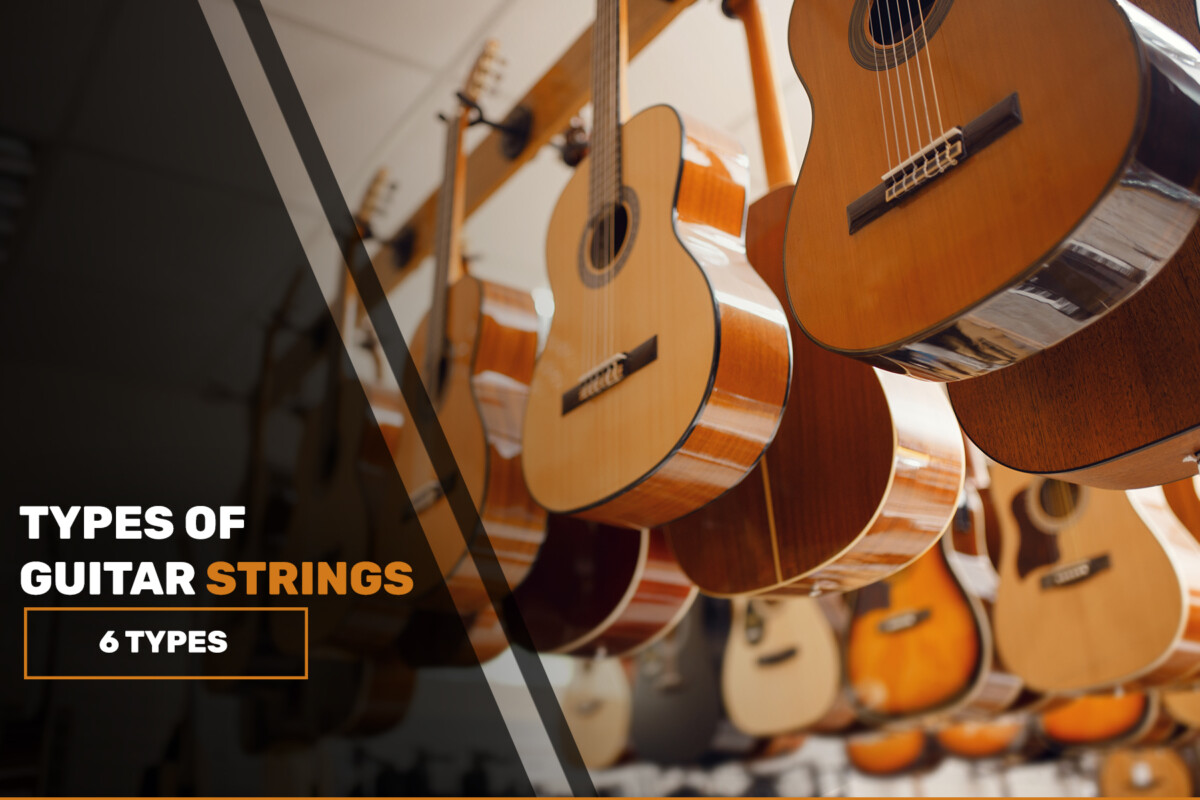To all guitar enthusiasts! Are you interested in learning more about the various guitar string options? You’re lucky, then! The various kinds of guitar strings and what makes them unique will be discussed in this article.
We’ll discuss the benefits and drawbacks of each type of string, from the tried-and-true steel strings to the more modern, fancy-coated ones, and help you select the set that’s ideal for you and your playing style.
If you’re new to all of this, don’t worry; this article will provide you with all the knowledge you need on guitar strings. So take out your guitar and join me as we explore the amazing world of strings!
Table of Contents
Types Of Guitar Strings
Steel Strings
Do you know what steel strings are? The most common kind of strings you’ll find on guitars are these. They have a steel core that is wrapped in various metals, such as nickel or phosphor bronze.
With these strings, you can have a guitar with a cler, sharp tone that works well for all types of music. Both electric and acoustic guitars will be used by them. They’re popular among guitarists since they’re simple to find, reasonably priced, and have amazing tones.
Accordingly, these strings are an excellent alternative if you’re just getting started with a guitar or you’re searching for a nice all-around string.
Nickel-Plated Strings
These match the standard steel strings you’re probably used to, but instead of having a standard nickel coating on the steel core, they have a unique nickel coating. Compred to standard steel strings, they have a different tone that is warmer and softer because of this coating.
They are therefore ideal for styles like blues, rock, and jazz that seek a warmer tone; additionally, they last longer since they are more corrosion-resistant.
Nickel-plated steel strings may be the way to go if you want to try something different and give your performance some depth.
However, they’re still accessible and reasonable priced, but they’ll sound distinct from traditional steel strings. Try them out to see if you like the sound, then!
Pure Nickel Strings
Are you willing to make your performance more dynamic? These strings have an incredibly smooth and soft sound that is ideal for styles like jazz and blues because they are entirely made of nickel.
Compared to nickel-plated steel strings or normal steel strings, they offer a warmer and softer tone. Additionally, they’ll provide your performance a good sustain and a better feel.
Pure nickel strings are worthwhile to try if you want to give your playing some smoothness and warmth.
Although they are less frequent than steel or nickel-plated steel strings, will provide you with a special tone that you cannot obtain from other types of strings.
You’ll also feel like a jazz expert thanks to their smoothness and sustain! So don’t be hesitant to experiment and try pure nickel strings!
Stainless Steel Strings
Are you trying to find a string that can support your playing? Stainless steel strings might be just for you! These strings are particularly strong and resistant to rust since they are constructed of a specific steel alloy.
In comparison to standard steel strings, they will last you a lot longer. Additionally, they give your guitar a crisp, clear tone that works well for a variety of musical styles. Moreover, stainless steel strings are an excellent choice if you play more and wish to change your strings less frequently.
Although they are less popular than standard steel strings, they are still simple to find and are well worth checking out.
Explore the top options available in the market when it comes to best nylon strings, and find the perfect set for your needs and preferences in our expert guide
Coated Strings
Are you sick of always changing your strings? Perhaps coated strings will work for you. These strings feature a unique covering that protects them against dirt, sweat, and oil.
Your strings have a super shield similar to this one! They are made to last longer and sound better thanks to this coating.
Coated strings are just ordinary strings with an additional layer of protection to help them last longer and maintain their beautiful tone.
They’re ideal for musicians who want to keep their instruments in excelent form for an extended period. You might be pleasantly surprised if you give them a try and see if you like them!
Classical Strings
Unlike typical steel strings, which are made of gut or synthetic materials, classical strings are constructed of a different material.
They provide your guitar with a warm, delicate sound that is ideal for styles like fingerstyle and classical music. They’ll give your guitar a soft blanket-like sound, making it feel warm and inviting.
Try using classical strings if you wish to play more classical music or if you like a gentler tone. Although they are less popular than standard steel strings, they will provide you with a special sound that you cannot get from other types of strings. Try them out, and you’ll soon feel like a classical master!
Learn about the finest guitar strings for beginners, and discover which options are best suited for your playing style and skill level in our comprehensive guide on selecting the ideal strings for new guitar players.”
Guitar String Sizes
Did you know that size matters in the context of strings? It all comes down to the string’s thickness. For various playing styles and individual preferences, several sizes are preferable.
- Light gauge strings: The smallest and easiest to press down are light gauge strings. They are ideal for new players or those with a lighter touch.
- Medium gauge strings: These mid-range strings are neither too thick nor too thin. They are a fantastic all-around option for most players and fit a variety of playing styles.
- Heavy gauge strings: The thickest strings available, these are ideal for players with heavier fingers or for styles that demand a lot of strumming.
The thickness or thinness of the string can be summed up as the string’s size. Medium gauge strings are a solid all-around option, heavy gauge strings are ideal for guitarists with a heavier touch or for genres that call for a lot of strumming, and light gauge strings are simple to press down.
Personal choice is almost everything, so feel free to experiment and find the size that works best for you!
Not only that but you can also discover how long guitar strings last and how to extend their lifespan in our in-depth guide
Final Words
All right, guitar players, we’ve talked a lot about the various guitar string kinds and their distinctive characteristics. steel strings to stainless steel, coated, pure nickel, steel strings, and classical strings. Finding the ideal suit for your playing style and personality is key.
In order to find the ideal set of strings for you, don’t be afraid to experiment with various types and gauges. Enjoy your new set of strings and happy strumming!



